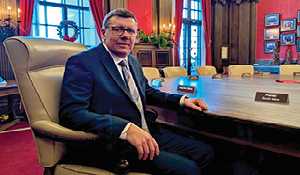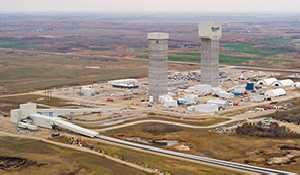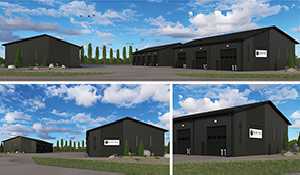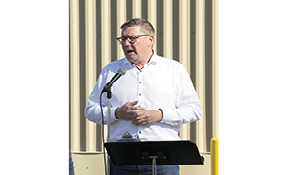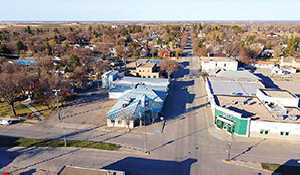O’Toole responds to chamber questions and concerns
June 22, 2021, 9:33 am
Spencer Kemp, Local Journalism Initiative Reporter


Last week Conservative Party leader Erin O’Toole addressed the Moosomin Chamber of Commerce alongside the Weyburn Chamber of Commerce and Estevan Chamber of Commerce.
In a meeting held via Zoom, O’Toole answered questions posed to him by Kevin Weedmark and Larry Heggs on behalf of chamber members. Following are the questions and answers.
The first question comes from Greg Gillepsie from Moosomin. He’s curious about the Conservative approach to pipelines. Energy East was a project that would have had a big impact in the Moosomin area. The plan included a feeder pipeline from Cromer to Moosomin. That was a big impact on our community when it was cancelled, but now we see other resource projects trying to take our resource products to market cancelled. What would be the Conservative approach to pipelines?
I talk a lot about my military service but my first job when leaving home was working with TransCanada PipeLines. I inspected pipelines, I got my boots dirty and I know how important it is to get our energy to market is for price. As a young lawyer finishing law school I worked for the Canadian Association of Petroleum Producers and as an Ontario MP I have been one of the strongest champions for our oil and gas sector and for our innovation.
The failure of Trudeau on pipelines is probably the most historic failure in our country’s history. We had multiple pipelines going to approval under the Harper government, we had a balanced budget, we had investment coming to Canada and under Mr. Trudeau, we’ve lost Keystone XL twice, we’ve lost Energy East, he cancelled Keystone XL and had to buy Trans Mountain with our money. It shows his policies have made us poorer and have divided our country. In my first 100 days, the Conservative government will eliminate the prohibitions of Bill C-69 that have held back our energy sector and our natural resources because these same issues come up in my province, in Northern Ontario. There’s a long history of proud development of our resources. I think the measures of Bill C-69 were the reason Energy East was cancelled by TransCanada. Under Mr. Trudea they don’t even call themselves TransCanada anymore because there’s been such a signal sent by the Trudeau government that investment in resource development is not welcome. It will be under a Conservative government, and in fact, I have been talking about Canadian leadership on ESG, Environmental Social Governance, and Indigenous participation in the resource industry, or ESGI as I call it.
If you want to buy resources like energy, softwood lumber, minerals, and ensure they come from an ethical place where emissions are coming down and indigenous partnerships are struck and role of law is in place, resources should be bought from Canada and we’re going to turn that into a force for Canada rather than Mr. Trudeau’s attacks on the sector.
Regarding your climate change plan, what significant differences are there from the Liberal plan to your plan? What will the public see? Will we see different prices at the pumps or will it impact agriculture?
The biggest difference with the plan I proposed in March and Mr. Trudeau’s approach is my plan is not a carbon tax despite what some people like to say who haven’t read the plan. If you don’t send a cent to Ottawa it is not a tax. What it is, and I will acknowledge this, is we’ve talked about putting a price on carbon at a consumer level, but it would be a price that is a third of what Mr. Trudeau is proposing. Here’s the catch, it’s a price where people maintain their own account. That price for small business and farming operations would be sequestered in their own low-carbon savings account. Much like you would transfer between chequing and savings this would be a sequestered account. The only limitation on it would be for future purchases for small businesses or an ag producer is for it to be something that has an environmental positive on emission reduction, buying local, and efficiencies. It will actually open up private sector investment to access those sequestered funds, much like a RESP would put money into an account, it’s dedicated for that purpose.
Why we’ve taken this approach is that people don’t trust sending billions to Ottawa. Mr. Trudeau said he would never increase his tax but he’s tripled it, he’s broken his promises many times. This sets a price that is fair and allows people to be in charge, and remember this is our proposal as an alternative to Mr. Trudeau’s carbon tax backstop, a backstop that Saskatchewan, Alberta, and Ontario took to court. The Supreme Court of Canada backed up Trudeau’s plan but it did give the provinces time to come up with their own. If Saskatchewan comes up with one that meets the targets, I think that’s even better than what I am proposing. But what I’ve shown is you can tackle emissions without just sending more money to Ottawa.
Given your military background, would you care to share any of your personal experiences in regards to the sexual misconduct issues in the military, and do you think that the increased attention and the resulting disciplinary actions are good or bad for our military personnel?
I served alongside some incredible women in the Canadian Armed Forces. I served under them leading me, I was a navigator alongside some incredible pilots who were women that I would report to. I have so much respect.
What do I owe young women? The ability to serve their country free from a culture of harassment with respect to their nation. When Minister Sajjan ignored a complaint from a woman brought to the ombudsman, someone who followed the process, ignored it and covered it up but Mr. Trudeau says he didn’t, they failed that woman and I want to send a real signal. When I served in the ‘90s there were some real cultural problems. We have to show that when much is given, much is expected. And much is given to our military people. They have extraordinary training, powers, and operational training. Because of that, especially with senior officers, I have high expectations of ethical conduct.
We see an increasing conversation in Western Canada around separation. How would your party work to unite the country?
This is an important issue and it’s the first issue I brought up to Trudeau in my first full day as opposition leader. Let’s think for a minute, when I was appointed to the cabinet by Steven Harper who served for a decade from Western Canada, we had a balanced budget and investment coming to Canada, there was no division in Canada. If you mentioned the word Wexit or Buffalo, people would think you’re talking about the animal, not the political movement. That shows that failed, unethical ideological leadership can cause even patriotic Canadians to have frustration about our confederation. It also shows that ethical leadership that looks to unleash the potential of energy in Saskatchewan and Alberta with working families across this country. We don’t hold back provinces, we respect their jurisdiction and we can recommit to this great country and I know that beneath the frustration there’s a desire to make Canada work. I am going to say that anybody who is that frustrated, join Robert Kitchen and me as we defeat Justin Trudeau, the ideological source of this division. Don’t use a vote to indirectly help Trudeau.
We saw an RCMP officer, Constable Patton, killed in the line of duty in Saskatchewan on the weekend as he was attempting to stop a stolen truck. The suspects have been charged with manslaughter and a few minor charges. Do you think that there should be tougher laws in cases like this to protect police officers who are doing their duty?
Any of these acts that are intentional against someone in uniform, the highest penalty should be applied to these people. And some of the roadside risks officers have as well. I would support enhanced sentencing conditions for people that take risks even if there is not the intention to harm but risks for someone who is doing the public good by keeping the community safe. I would support these measures. We have to support law enforcement who are given a very difficult job to do. One thing I learned from my colleagues in Western Canada is the economic dislocation caused by the Trudeau government’s policies has led to massive increases in rural crime, and rural crime and response times puts added strain on law enforcement.
We’re the only party in the House of Commons that stands up for victims and stands up for people that wear the uniform. If I become the Prime Minister I will be the first person (in that position) to have worn a uniform in Canada since Lester B. Pearson.
How does your government feel about equalization and how would you make it more fair across the country?
Right now the Alberta legislature is going to be holding a referendum because people are frustrated. The fact that Alberta has been contributing in a massive way to equalization and then in the last five and a half years they’ve seen the federal government actually attack the sector that has given billions to equalization over the past decades. It is not only unconstitutional in my view, it’s morally wrong. I think that we have the best country in the world, unlike the other parties and groups out there want to cancel Canada Day and are so disappointed in our country. We can be better, but we’re a pretty darn great place and let’s commit to being better but let’s also respect this great country we have. That means respecting the constitution, which means respecting the very principles of the country where these ten provinces work together for the wellbeing of everyone collectively.
Equalization is meant to be when you have success let’s make sure that folks don’t fall behind. Historically we know the stories of fish from the Atlantic being sent to the prairies during the dust bowls. That sort of ‘we’re in it together’ is what we need to restore.
What do you think the Conservative government should do different in the next election to become elected?
We have missed the mark where some Canadians wanted to see a little more from us on climate change, on reconciliation, on a range of things and I’ve said, and my caucus knows, that we have to share the hopes, fears, and aspirations of Canada in 2021 coming out of the biggest challenge of our lives both economically and health-wise. If we’re not tackling the issues the people want to hear from the Conservatives on? We’re not going to win the trust of enough Canadians.
I have to make sure we have a conservative approach to climate change, to reconciliation. I want to make sure the Conservatives earn the trust of the entire country and get this country back on track. That means we have to look at where we didn’t meet the expectations of Canadians and rebuild that coalition we had in 2011 where we won a majority government and we got the country moving. I am very proud of my team and I want Conservative voters to know we can tackle the challenges facing the country, unite the country, and get people back to work.
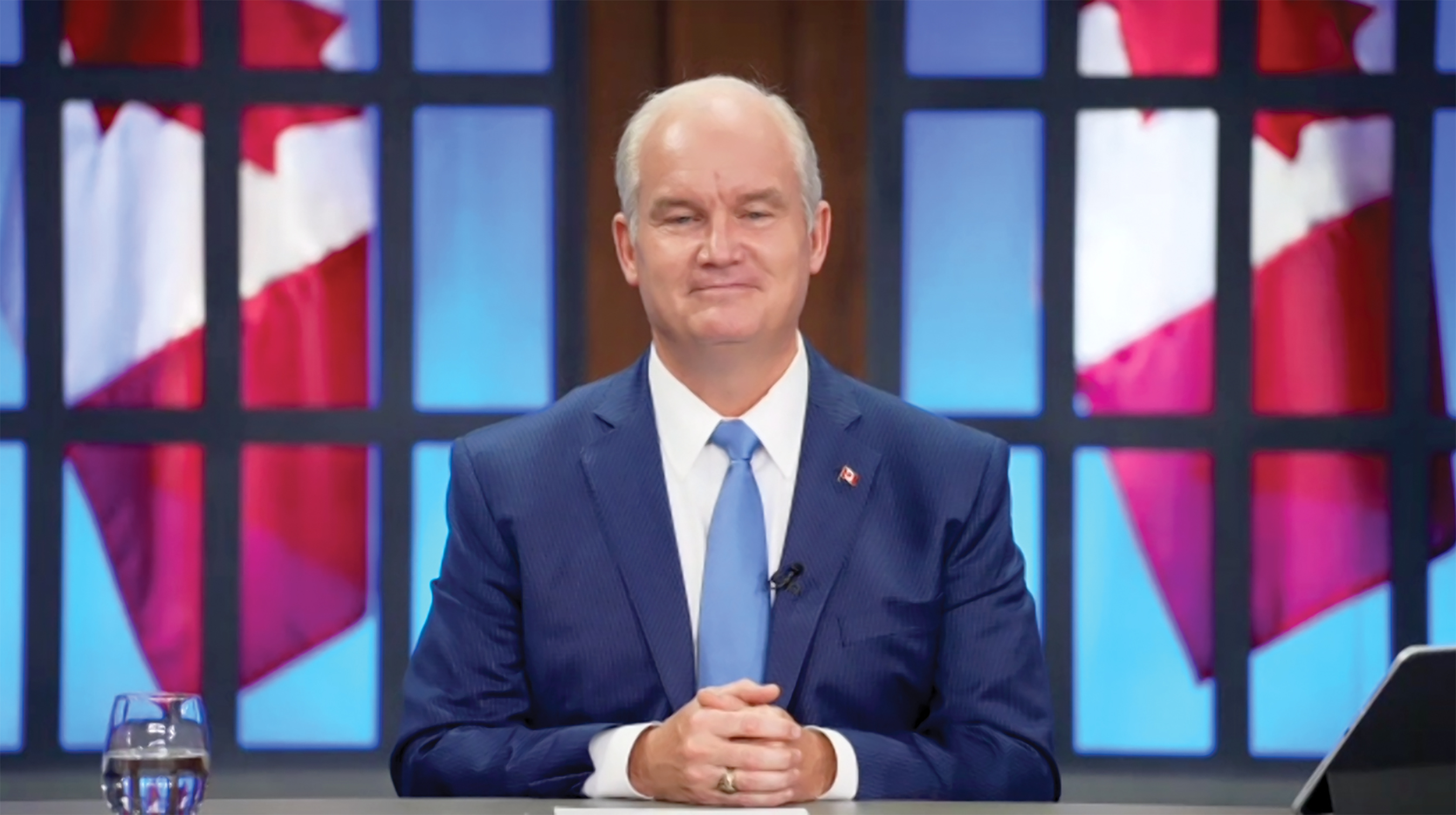

How would you approach bringing the budget back to balance? Where would you start and how long would it take?
In the last year or so we’ve had over $300 billion (in deficit spending), now some of that was needed and we supported it, but when they were spending hundreds of millions of dollars to pay 15-year-olds to stay home who stay with their parents already that are dependants that aren’t at risk of Covid? When they’re willing to spend almost $1 billion on their friends at the WE Charity? They gave untendered contracts to former Liberal MP’s? This was a smorgasbord of unethical spending from the Liberal government. What we’re going to have to do is focus on the short term for direct aid on the highest impacted sectors, tourism especially, hospitality, which are a majority of women entrepreneurs. We’ve actually lost around 30 years of progress for women in the workforce because those highly impacted sectors are struggling.
We’re going to have to spend a bit of money in the first couple years of our mandate to right the ship economically, eliminate the anti-oil and gas and encourage investment and encourage talent and then commit to having the budget balanced over the course of the decade based on giving a kickstart to our economy and all sectors of our economy. We need to show that projects can be built in Canada. Pipelines can be built, we can be world leaders in carbon capture and sequestration. That is what some of the policies we are putting out there are meant to show. We are really going to ignite a private-sector-led economic recovery.
Dana Crosson owns Westwind Greenhouse in Moosomin and she says the Conservatives promised to lift the carbon tax if elected, but it seems now that they are proposing a carbon tax capped at $50 a tonne. She is saying that right now the carbon tax on our energy bills in Saskatchewan are about 25 per cent of the bill, so whether it’s a tax or going into an individual fund, or wherever it’s going, that charge with the GST on top of it, as business owners we can’t afford that. Can you respond to her?
We want to provide as much relief as possible, and I said to Premier Moe if there is a made-in Saskatchewan approach we want to partner up. We want to get our emissions down and minimize the disruption. Ours is not a carbon tax, it is a carbon price but it is not a carbon tax because nothing is sent to Ottawa. The price that is used is dramatically lower, and the pledge we made to meet emission reduction targets as a part of Paris a pledge set by Steven Harper. Those targets are difficult, there are some challenges, but we’ve worked with a modeling firm to minimize the disruption and we will always be committed to trying to get it right. I do think we have to come up with something in the consumer and transportation space because it’s 60 per cent of our national emissions. What my hope is business owners and ag producers in provinces like Saskatchewan, Alberta, and Ontario work with us to come up to us and say how we will meet our objectives which I think is important. It’s important for Canada to meet our part but to minimize disruption in some highly-impacted parts like in ag. If there is a different, more scaled-in approach I’m open to that because I don’t want to see people costed out and I want to see some of the approaches on the low-carbon savings account even more effective. We’re open to getting this right, and again I will say that what we’ve put forward on the table is our proposal that is an alternative to the Trudeau top-down always going up price, but it will take a back seat to a plan from Saskatchewan if there is a made-in-Saskatchewan approach.
Based on the Covid situation that’s been created, we’ve all realized there is a greater demand to be able to do our products and services online or through the internet. Saskatchewan in general faces a concern with our ability and our internet coverage. I was curious if there would be federal money, not just in Saskatchewan but across the country, to boost coverage?
This pandemic has shown the digital divide in our country in a major way, especially in rural parts of our country. Yes, there will be a federal component, but I don’t promise to solve all the challenges in one year. We’re going to make it expedited and simplified because I’ve spoken with municipalities and utilities and there are seven programs in Ottawa related to broadband and high-speed internet. Only our government would have seven different programs to solve one problem. It’s why some provinces have given up waiting for an Ottawa plan and even though telecommunications and wireless spectrum are federal they’re coming up with their own solutions. What I want to do is simplify and put a significant investment in digital infrastructure. Ag needs it, small businesses need it, education, well-being, and access to services need it. This is where having a Prime Minister with business and military and getting things done experience as opposed to our photo-op Prime Minister would be a good approach to getting things done for a change. Tweet


























